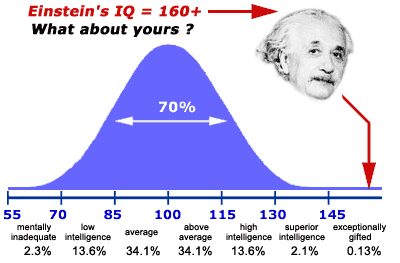In psychology, intelligence refers to the cognitive abilities of an individual to learn from experience to reason well and to cope with demands of daily living. It relates to how an individual is coping with the world around him or her.
The Intelligent Quotient is obtained by dividing the mental age (MA) by the chronological age (CA) so that children of different chronological age can be compared. To remove the decimal point, the result is multiplied by 100. Therefore, IQ = MA/CA X 100. For example, if a child’s mental age is 6yrs 6months and his chronological age is also 6yrs 6months, then his IQ is 100. IQ that is over 100 indicates that the person is more intelligent than average. If the MA is 10, CA is only 8yrs, then IQ = 10/8X100 = 125. Conversely, if IQ is less than 100 it indicates that the individual is less intelligent than average. A child with CA of 10yrs and an MA of 7yrs is calculated as 7/10X100 = 70.
What this means is that how old you are (chronologically) has nothing to do with how intelligent you would become. Apparently, this is one psychological reason why we have some adults reasoning like children and some youngsters or adolescents reasoning better than some adults. However, there is a certain chronological age that you will attain and the ability to learn new skills for new problems begins to decline. That is why it is often advised that men who are too old do not hold sensitive positions that require a lot of creativity. When people in this class attain such age, they will only be able to use the previously learnt skills (traditionally referred to as wisdom) to solve new problems – some of which end up with defects. People with higher than average intelligence show more high and very low in specific facets of their intelligence than people with below average intelligence.
There are basically two types of intelligence; Fluid and Crystallized Intelligence. Fluid Intelligence has to do with the ability to learn or invent new strategies for solving new kinds of problem, while Crystallized Intelligence is the ability to use previously learnt skills to solve familiar problems. Meanwhile, the ability to learn new skills decline from middle age (45-60)
There are also seven dependent types of Intelligence; Linguistic, Logical, Musical, Artistic, Kinesthetic, Interpersonal (athletic), Intrapersonal (personal adjustment). For example, great skills reflect intelligence just as much as mathematical skills. Ironically, most people only focus on verbal and logical aspects to refer to an individual as highly intelligent. In this case, President Barack Obama will be assumed to be more intelligent than President Goodluck Jonathan, simply because the former is more vocal in his speeches than the latter.
There are factors that can influence intelligence significantly. Heredity and our experiences combine to determine how intelligent we would be. Intelligence can also be enhanced by enriching young children’s intellectual environment. For instance, the kind of clique or folks a child associate with can serve as a determinant. The books, films, music, magazines and other sources of information can also play a role. Furthermore, proper nutrition can influence how intelligent an individual will churn out to be. When a child is properly nourished, it helps the brain to develop normally and the part that is responsible for intelligence and reasoning – cerebrum will be ignited.
Technically, intelligence must not be mistaken for brilliance as there is a thin line difference between both variables. Brilliant people do not often get to the apogee of their career but intelligent people can navigate their way to the top. No matter how cumbersome or tedious a task is, an intelligent person will always prove a point – out of creativity – but brilliant minds are so narrow-minded that they never think there could be several other ways out of the predicament. Using the university setting as a case study, it is invariably convenient to hypothetically state that brilliant students are often retained in the classrooms as lecturers while the intelligent students explore the world beyond the four walls of the university. For instance, in the 2010/2011 academic session, the University of Ibadan awarded scholarships to 75 students who graduated with a first class honor. The psychology behind this is to retain the students in the system and perhaps have them succeed the older lecturers. But the intelligent students among their set will hustle up their way out of the four walls to the corridors of power or some other topmost leadership positions. Paradoxically, some would even end up as either state or federal lawmakers, thereby making laws for even those who are assumed to be brilliant. Certainly, we must never goof by assuming that brilliancy is the same thing as intelligence.
Have you ever heard that “INTELLECTUALS RULE THE WORLD”? This is substratum!
To find more articles like this, kindly click here
credits: Simeon Christian Chukwu
